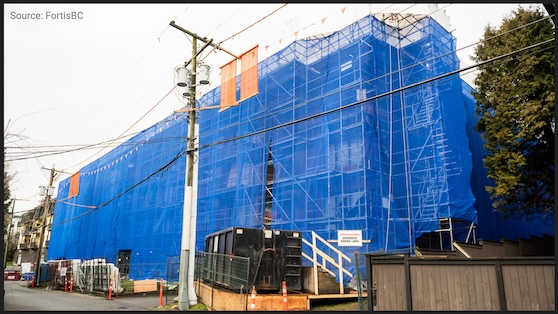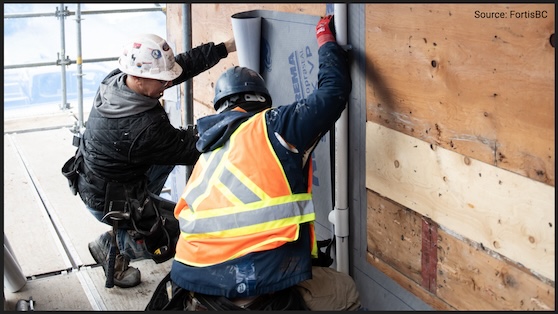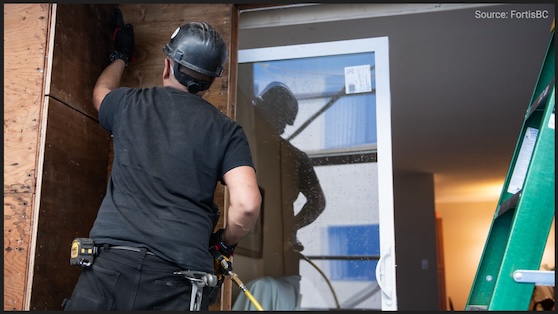
Emissions Reduction
Energy Efficiency
Envelope
Features
HVAC & Plumbing
Net Zero
News
Residential
FortisBC leads $50M “real-world study of deep energy efficiency upgrades” in older homes
March 15, 2024 By Anthony Capkun
 Metro Vancouver Housing’s Manor House—a 1972 apartment building in North Vancouver—is undergoing a deep energy retrofit with the aim of reducing energy use by half or more. Source: FortisBC.
Metro Vancouver Housing’s Manor House—a 1972 apartment building in North Vancouver—is undergoing a deep energy retrofit with the aim of reducing energy use by half or more. Source: FortisBC. March 15, 2024 – FortisBC Energy Inc. has embarked on a $50-million pilot project aimed at uncovering the best pathway to reduce energy use in older homes and multi-family housing units.
“To our knowledge, this is the largest targeted, real-world study of deep energy efficiency upgrades in BC homes, and the information will be invaluable to us and others looking to transform energy use,” said Joe Mazza, FortisBC.
Working with partners such as Metro Vancouver Housing and participating customers from across the Lower Mainland and Southern Interior, FortisBC now has 20 single-family homes and four apartment buildings participating in a deep energy retrofit—“a comprehensive, whole-home upgrade aimed at reducing energy use by half or more”.
During each phase of the multi-year pilot, FortisBC will analyze the energy reductions, customer experience, and overall costs. The information gained will be used to help industry, policymakers, and FortisBC determine how best to ensure older housing units can continue to meet the needs of families as the province moves toward net-zero.
“Determining the most effective path to greatly lower energy use in older homes is a critical way we can help lower emissions while helping customers save money on energy costs,” Mazza added.
Buildings account for just over 10% of BC’s GHG emissions, notes FortisBC. To address this, the province has set a target of lowering GHG emissions in the building and communities sector by 59% to 64% of 2007 levels by 2030.

The current pilot takes an envelope-first approach to prevent heat loss and reduce heating demand. Source: FortisBC.
Older homes and apartment buildings pose a complex challenge to achieving those targets because a significant number were built before energy efficiency was incorporated into the National Energy Code for Buildings in 1997, adds FortisBC. With many expected to remain in use by 2050, they will need to undergo a deep energy retrofit to achieve these targets.
“Metro Vancouver Housing has set targets to cut greenhouse gas emissions from our buildings by 45% [from 2010 levels] over the next 10 years and significantly bring down energy consumption through rehabilitation projects,” said George V. Harvie, chair, Metro Vancouver board of directors.
“Partnering with FortisBC on a deep energy retrofit project offers a way to explore and implement new technologies to improve energy efficiency and reduce GHGs, resulting in a building that’s more resilient and comfortable for tenants,” added Harvie.
“As we evolve our energy efficiency programs, we’ll be able to undertake deeper energy retrofit projects that are more complex, intensive, and comprehensive than what’s supported today through traditional energy conservation programs and rebates, continued Mazza. “It will allow us to realize energy efficiencies with home and building owners in ways that might have been out of reach before.”

During each phase of the multi-year pilot, FortisBC will analyze the energy reductions, customer experience, and overall costs. Source: FortisBC.
The current pilot takes an envelope-first approach to prevent heat loss and reduce heating demand. This includes upgrades to walls, windows, doors, and insulation. Each home and building will also have its space heating, domestic hot water, and ventilation systems upgraded to be as energy-efficient as possible.
This includes installing new gas-heating technologies like dual-fuel hybrid systems or gas heat pumps that have achieved efficiencies of more than 100% in manufacturer testing, and determining whether this can be replicated in real-world settings.
Each of the participating homes and buildings have undergone a detailed energy assessment, modelling, and design phase and these early indicators show promising results. For example, Metro Vancouver Housing’s Manor House—a 1972 three-level apartment building in North Vancouver—is projected to reduce GHG emissions by 66%, and energy usage by 56%.
All 20 participating single-family homes have completed the majority of upgrades and construction is now underway in the four apartment buildings. Once complete, each home and building will be tested for one year to determine the energy savings.
Print this page